Uniform overexpression and rapid accessibility of alpha5beta1 integrin on blood vessels in tumors
- PMID: 15972964
- PMCID: PMC1603436
- DOI: 10.1016/s0002-9440(10)62965-3
Uniform overexpression and rapid accessibility of alpha5beta1 integrin on blood vessels in tumors
Abstract
Integrin alpha5beta1 is among the proteins overexpressed on tumor vessels and is a potential target for diagnostics and therapeutics. Here, we mapped the distribution of alpha5beta1 integrin in three murine tumor models and identified sites of expression that are rapidly accessible to intravascular antibodies. When examined by conventional immunohistochemistry, alpha5beta1 integrin expression was strong on most blood vessels in RIP-Tag2 transgenic mouse tumors, adenomatous polyposis coli (apc) mouse adenomas, and implanted MCa-IV mammary carcinomas. Expression increased during malignant progression in RIP-Tag2 mice. However, immunoreactivity was also strong in normal pancreatic ducts, intestinal smooth muscle, and several other sites. To determine which sites of expression were rapidly accessible from the bloodstream, we intravenously injected anti-alpha5beta1 integrin antibody and 10 minutes to 24 hours later examined the amount and distribution of labeling. The injected antibody strongly labeled tumor vessels at all time points but did not label most normal blood vessels or gain access to pancreatic ducts or intestinal smooth muscle. Intense vascular labeling by anti-alpha5beta1 integrin antibody co-localized with the uniform CD31 immunoreactivity of tumor vessels and contrasted sharply with the patchy accumulation of nonspecific IgG at sites of leakage. This strategy of injecting antibodies revealed the uniform overexpression and rapid accessibility of alpha5beta1 integrin on tumor vessels and may prove useful in assessing other potential therapeutic targets in cancer.
Figures
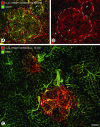
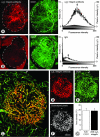
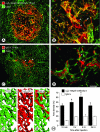

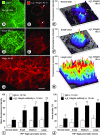
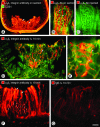


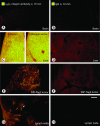
Similar articles
-
Rapid access of antibodies to alpha5beta1 integrin overexpressed on the luminal surface of tumor blood vessels.Cancer Res. 2005 Apr 1;65(7):2712-21. doi: 10.1158/0008-5472.CAN-04-2691. Cancer Res. 2005. PMID: 15805270
-
Antiangiogenic therapy decreases integrin expression in normalized tumor blood vessels.Cancer Res. 2006 Mar 1;66(5):2639-49. doi: 10.1158/0008-5472.CAN-05-1824. Cancer Res. 2006. PMID: 16510583
-
Complementary, Selective PET Imaging of Integrin Subtypes α5β1 and αvβ3 Using 68Ga-Aquibeprin and 68Ga-Avebetrin.J Nucl Med. 2016 Mar;57(3):460-6. doi: 10.2967/jnumed.115.165720. Epub 2015 Dec 3. J Nucl Med. 2016. PMID: 26635338
-
Probing the structural and molecular diversity of tumor vasculature.Trends Mol Med. 2002 Dec;8(12):563-71. doi: 10.1016/s1471-4914(02)02429-2. Trends Mol Med. 2002. PMID: 12470989 Review.
-
Targeting integrin α5β1 in urological tumors: opportunities and challenges.Front Oncol. 2023 Jul 6;13:1165073. doi: 10.3389/fonc.2023.1165073. eCollection 2023. Front Oncol. 2023. PMID: 37483505 Free PMC article. Review.
Cited by
-
Shifting perspectives from "oncogenic" to oncofetal proteins; how these factors drive placental development.Reprod Biol Endocrinol. 2018 Oct 19;16(1):101. doi: 10.1186/s12958-018-0421-3. Reprod Biol Endocrinol. 2018. PMID: 30340501 Free PMC article. Review.
-
Positive and Negative Regulation of Angiogenesis by Soluble Vascular Endothelial Growth Factor Receptor-1.Int J Mol Sci. 2018 Apr 27;19(5):1306. doi: 10.3390/ijms19051306. Int J Mol Sci. 2018. PMID: 29702562 Free PMC article. Review.
-
Expression Analysis of α5 Integrin Subunit Reveals Its Upregulation as a Negative Prognostic Biomarker for Glioblastoma.Pharmaceuticals (Basel). 2021 Aug 30;14(9):882. doi: 10.3390/ph14090882. Pharmaceuticals (Basel). 2021. PMID: 34577582 Free PMC article.
-
Vasohibin-2 modulates tumor onset in the gastrointestinal tract by normalizing tumor angiogenesis.Mol Cancer. 2014 May 4;13:99. doi: 10.1186/1476-4598-13-99. Mol Cancer. 2014. PMID: 24885408 Free PMC article.
-
Three-dimensional MR mapping of angiogenesis with alpha5beta1(alpha nu beta3)-targeted theranostic nanoparticles in the MDA-MB-435 xenograft mouse model.FASEB J. 2008 Dec;22(12):4179-89. doi: 10.1096/fj.08-112060. Epub 2008 Aug 12. FASEB J. 2008. PMID: 18697838 Free PMC article.
References
-
- Hurwitz H, Fehrenbacher L, Novotny W, Cartwright T, Hainsworth J, Heim W, Berlin J, Baron A, Griffing S, Holmgren E, Ferrara N, Fyfe G, Rogers B, Ross R, Kabbinavar F. Bevacizumab plus irinotecan, fluorouracil, and leucovorin for metastatic colorectal cancer. N Engl J Med. 2004;350:2335–2342. - PubMed
-
- Yuan F, Chen Y, Dellian M, Safabakhsh N, Ferrara N, Jain RK. Time-dependent vascular regression and permeability changes in established human tumor xenografts induced by an anti-vascular endothelial growth factor/vascular permeability factor antibody. Proc Natl Acad Sci USA. 1996;93:14765–14770. - PMC - PubMed
-
- Shaheen RM, Davis DW, Liu W, Zebrowski BK, Wilson MR, Bucana CD, McConkey DJ, McMahon G, Ellis LM. Antiangiogenic therapy targeting the tyrosine kinase receptor for vascular endothelial growth factor receptor inhibits the growth of colon cancer liver metastasis and induces tumor and endothelial cell apoptosis. Cancer Res. 1999;59:5412–5416. - PubMed
-
- Huang J, Frischer JS, Serur A, Kadenhe A, Yokoi A, McCrudden KW, New T, O’Toole K, Zabski S, Rudge JS, Holash J, Yancopoulos GD, Yamashiro DJ, Kandel JJ. Regression of established tumors and metastases by potent vascular endothelial growth factor blockade. Proc Natl Acad Sci USA. 2003;100:7785–7790. - PMC - PubMed
Publication types
MeSH terms
Substances
Grants and funding
LinkOut - more resources
Full Text Sources
Other Literature Sources
Molecular Biology Databases
Miscellaneous

